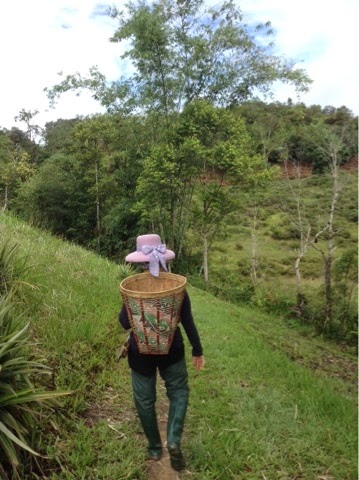I've been pestering Tepu' to bring me jungle veggie picking for awhile now, and finally the weather was fair enough to do so. I was elated! I felt that as a vegetarian, that gave me a one up and it was sort of an achievement! It was a rather special day as well because we were joined by Tepu' Uloh, Felice, Jess and Jon on our little adventure.
With our long sleeves and pants, wide brimmed hat, and uyuts (big rattan baskets used as backpacks) on our backs, we trudged our way into the forest in our wellies. It was about a 20 minute walk up and down little slippery slopes and hills, crossing tiny handmade bamboo bridges and wobbly logs, we arrived at a spot where our grandmothers decided there were enough vegetables for us to harvest.
Tepu' quickly gave us a crash course on the vegetable that can be picked and handed us samples of the correct vegetables. Looking all around, all I saw was a whole lot of green - it felt like I was standing in a huge salad bowl, however, they all looked the same to me. After locating a patch of ferns, I went straight in to plucking what seemed like the correct type of fern. Being rather clumsy, I had probably lost my balance many times on the uneven ground and mud, thank goodness for the 'tongkat' tepu had given me earlier that she efficiently hacked from one of the tree branches, I did not fall.
No sweat, I got it! How bout a picture! : Tepu' gracefully moving across the stream on a water pipe.
Me, thinking that I've finally found the right midin.. but yeap, they were wrong.
My one job for that hour was to pick midin and all I got was one bundle... apparently half of them were wrong. By that time, Tepu' has already collected a whole basket full of not just Midin, but Tengayan (a vegetable which grows exclusively in the Kelabit highlands) and mushrooms.
With our uyuts filled to the brim with vegetables, we tottered all the way back, passing the series of same bamboo bridges and muddy paths. As we walked along, both Tepu' Uloh and Tepu' Sinah Rang harvested more and more jungle veggies - More midin (different species) and bamboo shoots about 3 feet tall to be brought home. We also cut down an entire branch of a fruiting fig tree for Turu, the friendly neighbourhood hornbill to eat.
After we got back, I was still confused that I could not properly identify the right midin. So I put my wrong harvest with Tepu's correct ones. With Aunty Nicole's help, I made a video on comparing the lookalike ferns.
Tepu' Sinah Rang and Tepu' Uloh chopping a branch off a tree effortlessly.
'Processing' the bamboo shoot with Aunty Nicole for dinner that night.
Bamboo shoots have to be soaked overnight to remove the 'bulu' on the stem.
Tepu' teaching me how to properly prepare midin for dinner.
Best stir fried vegetables, EVER.
Midin has a slight crunch, comparable with heavily steamed broccoli. It's also a little slimy, just a fraction of what you'd get in okras. The aroma of the vegetable is a little sweet when fried and it doesn't have a very 'green' taste to it. I feel accomplished that I can probably walk into that patch of jungle and figure out which midin is edible or not. Perhaps I've only learned how to pick one type of vegetable this time, but maybe I'll learn more about it in my future visits. We picked a whole lot of it - enough for dinner and some for the next day. I'd fly back to Bario for this.
As a thank you for reading/scrolling through my post, here's a BONUS VIDEO!
Here's a clip of Tepu' Uloh cutting down a bamboo shoot with just two blows of a parang.
What's cooler than this?!


















